Port of Dover: Arrests made as Insulate Britain blocks port
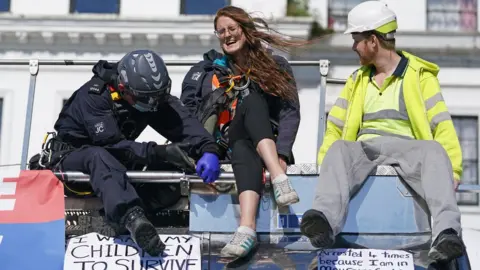 PA Media
PA MediaThirty nine people have been arrested after climate activists blocked Dover port, causing queues of vehicles attempting to cross the Channel.
Insulate Britain, which has brought chaos on the M25 five times in the past fortnight, said more than 40 people had gathered.
The Kent port - Europe's busiest ferry terminal - said passengers should take extra time for their journeys.
The main protest began at 08:20 BST and was cleared by police two hours later.
One lane of the A20 remained blocked afterwards, as two protesters were sitting on top of a tanker with their hands glued to the vehicle.
While she was on the tanker with her hand stuck to the railing, one protester who gave her first name as Stephanie said she did not want to be there.
She said: "I want to be home with my family spending time with them but if we don't do this they aren't going to have a future.
"The government are not doing enough. On the current trajectory we are heading for chaos."
Both Stephanie, 27, and her fellow protester Josh, 28, were later lifted down by police.
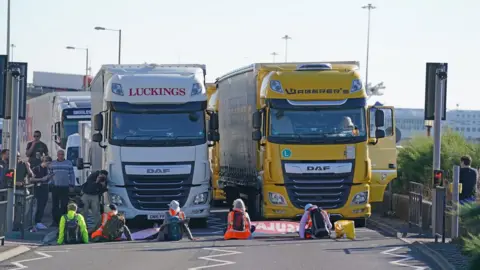 Insulate Britain
Insulate BritainKent Police said the protest caused "traffic disruption in Dover", with queues forming on the A20 and the A2 approaching the port.
All those detained on Friday were arrested on suspicion of causing a public nuisance and obstructing a highway, the force said.
Police said all those arrested remained in custody on Friday afternoon, when roads were again clear.
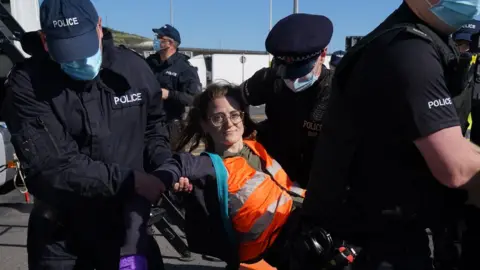 PA Media
PA MediaDover TAP, short for Traffic Assessment Project, was implemented by National Highways, due to the congestion.
It enforces a 40mph speed restriction on the A20 approaching Dover, and lorry drivers heading for the port must remain in the left lane.
The Port of Dover said at 11:21 BST that traffic had resumed and was flowing in and out of the site.
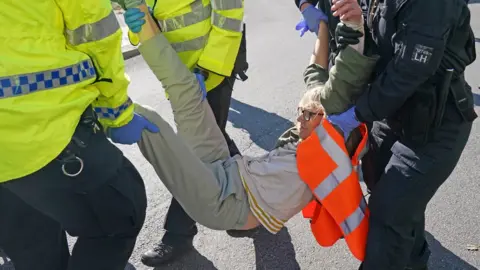 PA Media
PA MediaThe protest followed a court ruling won by the government which means climate change protesters can be jailed if they continue their campaign of blocking the M25.
Hundreds of campaigners previously forced the closure of the motorway in parts of Essex, Hertfordshire, Kent and Surrey.
Transport Secretary Grant Shapps said the government would take further action.
He wrote on Twitter: "We won't tolerate reckless behaviour on motorways or ports (Dover this morning). I'm therefore seeking a further injunction to prevent this disruption."
Later, the government confirmed a further injunction had been approved by the High Court to prevent protesters from occupying the A20 and strategic roads linked to the Port of Dover.
Mr Shapps said: "We are absolutely committed to protecting the right to peaceful protest, but it is unacceptable that people cannot go about their day-to-day businesses and that businesses, or critical supplies should be put on a knife's edge because of the reckless actions of a few protesters."
Home Secretary Priti Patel said: "The British public are rightly furious that the behaviours of a selfish minority have been putting lives at risk and causing untold disruption on our roads and now at Dover."
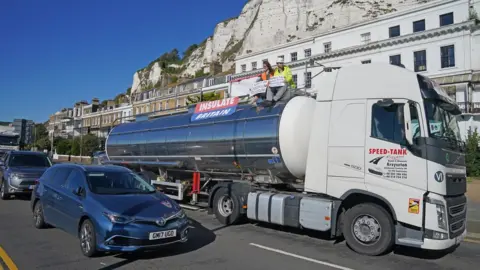 PA Media
PA MediaSeveral drivers remonstrated with activists in Dover.
Insulate Britain also held a demonstration outside the Home Office's Westminster headquarters.
Allow X content?
Ch Supt Simon Thompson, from Kent Police, thanked people affected for their patience, and said: "The impact this disruption had on the local community and port-bound traffic is not lost on us."
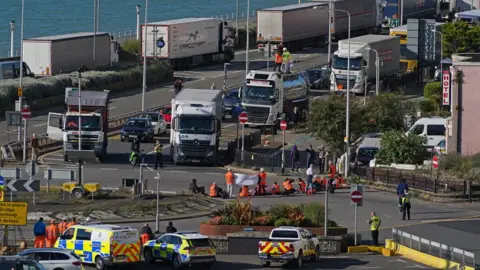 PA Media
PA MediaDover MP Natalie Elphicke called the protesters "hooligans".
Writing on Twitter, she added: "The port is the vital artery of our nation's trade - about one-fifth of all trade comes through Dover. We simply cannot afford further disruption to food and goods at this time."
Allow X content?
Insulate Britain, which is calling for government action on home insulation, said: "We are blocking Dover this morning to highlight that fuel poverty is killing people in Dover and across the UK.
"We need a Churchillian response: We must tell the truth about the urgent horror of the climate emergency."
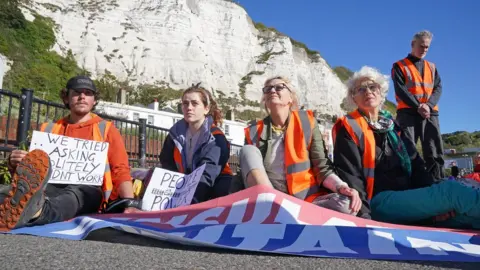 PA Media
PA MediaThe Port of Dover handles 17% of the UK's trade in goods. It was used by an average of 6,200 road haulage vehicles every day last year.
Doug Bannister, chief executive of the port, said it "implemented its tried and tested resilience plans in order to deal with the impact of the protest".
He apologised to travellers for the "disruption" but said the situation was "not of our making".

Follow BBC South East on Facebook, on Twitter, and on Instagram. Send your story ideas to [email protected].
